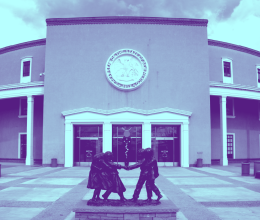No detention is safe. While New Mexico cannot directly regulate ICE, we can refuse to enable a system that violates human rights and due process. House Bill 9, the Immigrant Safety Act, would end our state’s complicity in these abuses while making our communities safer. Seven other states have already passed similar laws to protect their residents—it’s time for New Mexico to do the same.
What Does This Act Do?
The Immigrant Safety Act closes loopholes that allow ICE and private detention contractors to sidestep oversight by using local governments as intermediaries. It prevents state and local governments from entering agreements to detain people for federal immigration violations and stops the leasing of public land for immigration detention. By cutting off these pathways, the bill makes it significantly harder for ICE to operate or expand detention centers in our state. Ultimately, it fosters trust between immigrant communities and local public safety officials, ensuring that everyone feels safe seeking help when needed.
The Track Record of Harm
New Mexico has already seen the devastating impact of ICE detention. Since 2022, three people have died in custody at Otero and Torrance detention centers, which have long histories of human rights violations, including excessive solitary confinement and poor medical care. ICE exploits New Mexican counties, using them as pass-throughs to funnel no-bid contracts to private detention operators while avoiding scrutiny. This system isn’t just broken—it’s dangerous.
Protecting Our Communities
Detention centers don’t just harm those inside—they put entire communities at risk. ICE is more likely to conduct raids near detention facilities, increasing fear and instability. Removing state and local involvement in immigration detention reduces this risk and strengthens trust between immigrant communities and public safety officials. Our immigrant neighbors are vital members of our communities—ending these exploitative agreements is a step toward justice, safety, and dignity for all.





